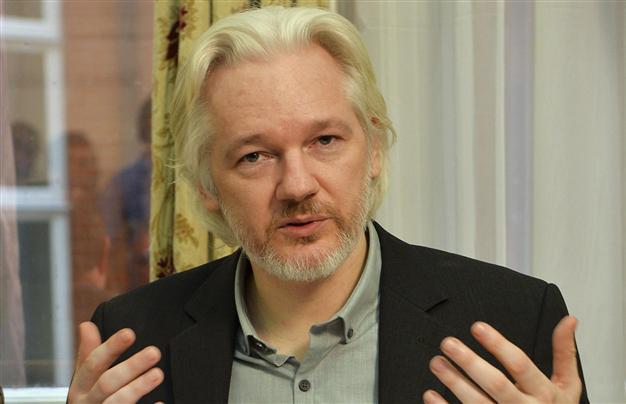Assange says will leave London embassy 'soon'
LONDON - Agence France-Presse

WikiLeaks founder Julian Assange gestures during a news conference at the Ecuadorian embassy in central London August 18, 2014. REUTERS Photo
WikiLeaks founder Julian Assange said Monday he would "soon" leave Ecuador's embassy in London but his organisation played down the comment, saying he would not depart until there was an agreement with Britain's government.
Assange, who sought asylum in the embassy two years ago, told a press conference: "I can confirm I will be leaving the embassy soon."
He added this would not be for reasons "reported by the Murdoch press", without elaborating further.
British media reported at the weekend, quoting a WikiLeaks source, that he was suffering from the potentially life-threatening heart condition arrhythmia and had a chronic lung complaint as well as dangerously high blood pressure.
But WikiLeaks spokesman Kristinn Hrafnsson told AFP: "What Julian meant is that his plan is to leave as soon as the British government honours its commitment."
Assange was accompanied at the press conference by Ecuador's Foreign Minister Ricardo Patino, who did not mention a plan for Assange to leave the embassy but also called for the governments involved in his case to take action.
"The situation must come to an end -- two years is simply too long," Patino said.
"We continue to offer him our protection... we continue to be ready to talk with the British government and the Swedish government to find a solution to this serious breach of Julian Assange's human rights."
Assange entered Ecuador's embassy in London in June 2012.
He took refuge there to avoid extradition to Sweden, where he faces allegations of rape and sexual molestation, which he strongly denies.
He fears extradition to Sweden would be a pretext for him to be transferred to the United States to face trial over WikiLeaks' publication of classified US military and diplomatic documents.
Assange had previously exhausted all legal options in the English courts to avoid extradition.
He spoke of his anger at being stuck in the embassy in an interview with this week's Mail on Sunday, describing his life as "sometimes lonely and sometimes peaceful."
"My stubbornness is my best and my worst quality. I won't give up," he told the newspaper.
